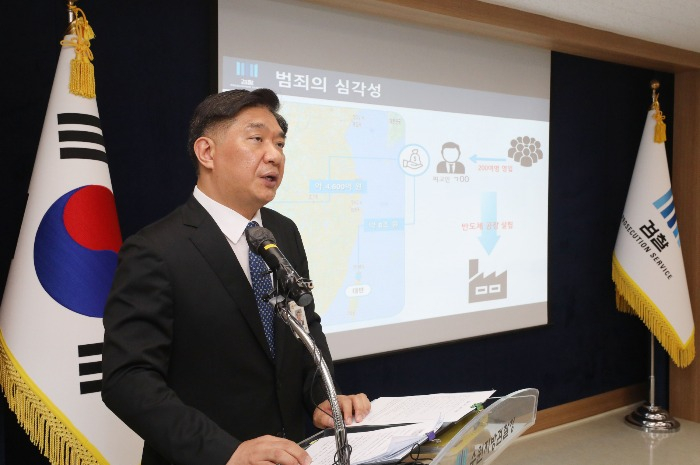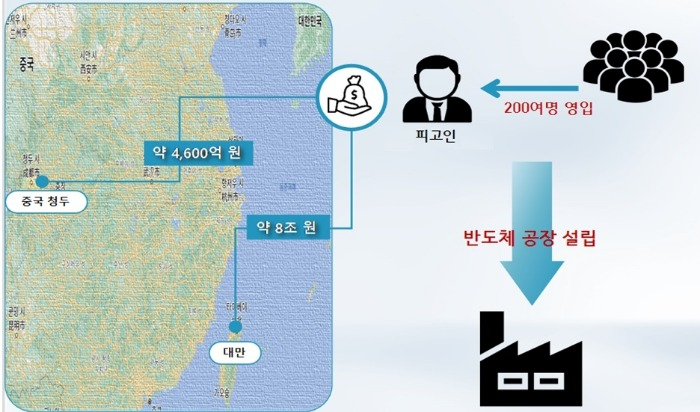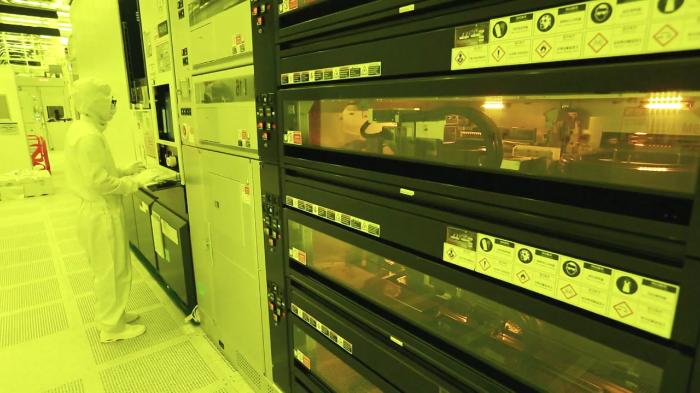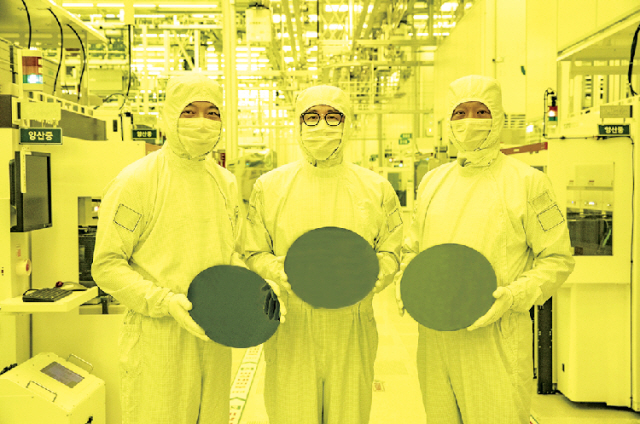Enemies at the door: Copycat Samsung plant in China
The copycat plant in Chengdu is understood to be rolling out prototype semiconductor chips
By Jun 13, 2023 (Gmt+09:00)
LG Chem to sell water filter business to Glenwood PE for $692 million


Kyobo Life poised to buy Japan’s SBI Group-owned savings bank


KT&G eyes overseas M&A after rejecting activist fund's offer


StockX in merger talks with Naver’s online reseller Kream


Mirae Asset to be named Korea Post’s core real estate fund operator



As Samsung Electronics Co. endeavors to cement its leadership in the semiconductor market, so its competitors are pulling out all the stops to topple the company’s decades-long dominance.
On Monday, the Public Prosecutors Office in Suwon, Gyeonggi Province, said it has arrested and indicted a former executive of Samsung Electronics and SK Hynix Inc. on charges of stealing Samsung’s trade secrets to build a copycat semiconductor plant in China.
The document leaks with confidential data are estimated to be worth up to several billions of dollars of damage to Samsung Electronics, headquartered in the city of Suwon.
The factory in Chengdu, based on Samsung’s proprietary designs and process layouts, completed construction only on the R&D portion last year. It is located just 1.5 kilometers from Samsung Electronics’ factory in the same city in China's Sichuan province.
The copycat plant is understood to have started rolling out prototype products. No further details such as their fabrication process have been disclosed.

Prosecutors said the alleged technology outflows constitute “serious crimes that could shake the foundation of South Korea’s semiconductor industry" and cause damage to Samsung of at least 300 billion won ($236 million) and up to several billions of dollars.
“If products of similar quality to that of Samsung Electronics were mass-produced, it would do irreparable harm to South Korea’s semiconductor industry,” a senior prosecutor Park Jin-sung said in a media briefing.
The accused, whose name has been withheld, was charged with violation of industrial technology protection and unfair competition prevention laws.
He had worked at Samsung Electronics and SK Hynix for 18 years and 10 years, respectively, and served as their vice president for some period.
Six other people were indicted for collusion with the primary accused to allegedly steal proprietary designs of Samsung’s semiconductor plants through a Samsung subcontractor. They will stand trial without arrest, along with the ex-Samsung executive.
After retiring from Samsung, the executive received about 460 billion won in investment from the Chinese city of Chengdu in 2015 to build a semiconductor chip plant there.
Additionally, he received a commitment of about 8 trillion won from an unidentified Taiwanese electronics manufacturer to establish a chip plant in Singapore. But the commitment was not fulfilled and the plant construction plant there was canceled.
He recruited about 200 former employees from Samsung and SK Hynix with offers of double salaries.

Among the technologies allegedly leaked to the China-based plant, the factory layouts and basic engineering data (BED), or cleanroom designs, are used to produce DRAM and NAND Flash chips on the 30-nanometer fabrication node, or smaller.
These are classified as key national technologies, which Samsung took more than 30 years to develop.
PICKING UP EFFORTS
Particularly, they noted that a South Korean semiconductor expert joined hands with a Chinese provincial government and a Taiwanese company in an attempt to outstrip the world’s No. 1 memory chipmaker.
In January of last year, a Samsung Electronics employee was arrested and indicted for allegedly leaking technologies related to the advanced chip fabrication of the 3 nm node to Intel Corp. At the time, the accused was seeking to move to Intel.

Late last year, nine former and incumbent research workers of Samsung Engineering Co. went to trial on charges of leaking the technology to enhance purity in semiconductor systems to a Chinese company.
Earlier this year, a former employee of Samsung subsidiary System Engineering Mega Solution and the head of a subcontractor were indicted for illegally transferring semiconductor equipment technologies to a Chinese competitor.
The semiconductor industry and legal experts point to South Korea's soft punishments for white-collar offenses, especially for sophisticated technology leaks, as one reason for the string of trade secret outflows.
According to South Korea’s Supreme Prosecutors’ Office, out of the 496 criminals who had been convicted of technology outflows over the past eight years, only 73 people were sentenced to jail. The average time they served in prison was just 12 months.
Under current South Korean law, a person convicted of cross-border technology leaks faces a maximum of six years in jail, even including additional penalties.
Write to Jin-Seong Kim at Jskim1028@hankyung.com
Yeonhee Kim edited this article.
-
 Korean chipmakersSamsung to supply new Exynos auto chip to Hyundai in close tie-up
Korean chipmakersSamsung to supply new Exynos auto chip to Hyundai in close tie-upJun 07, 2023 (Gmt+09:00)
3 Min read -
 Korean stock marketFunds with high exposure to Nvidia, Samsung yield higher returns
Korean stock marketFunds with high exposure to Nvidia, Samsung yield higher returnsMay 31, 2023 (Gmt+09:00)
3 Min read -
 Korean chipmakersSamsung takes steps toward XR device processor chips
Korean chipmakersSamsung takes steps toward XR device processor chipsMay 28, 2023 (Gmt+09:00)
2 Min read -
 Korean SMEsSamsung Electronics' smart factory project targets SMEs
Korean SMEsSamsung Electronics' smart factory project targets SMEsMay 25, 2023 (Gmt+09:00)
2 Min read -
 Korean chipmakersSamsung rolls out industry’s finest 12 nm DDR5 DRAM chips
Korean chipmakersSamsung rolls out industry’s finest 12 nm DDR5 DRAM chipsMay 18, 2023 (Gmt+09:00)
3 Min read -
 Korean chipmakersSamsung’s 3 nm chip production yield rises sharply
Korean chipmakersSamsung’s 3 nm chip production yield rises sharplyJan 09, 2023 (Gmt+09:00)
2 Min read


